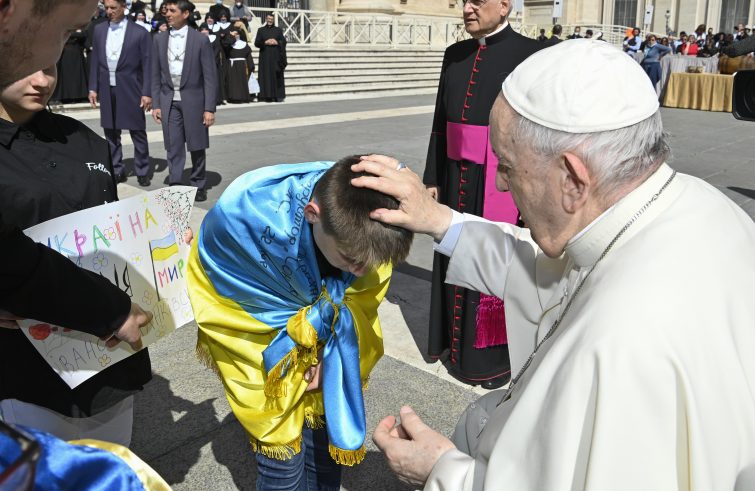
“Please, let us not forget the suffering people of war-torn Ukraine. Let us not become accustomed to living as if the war were something distant. May our memories, our affection, our prayers and our support always accompany this suffering people, living through sheer martyrdom”, the Pope reiterated his appeal in his remarks to the Italian-speaking faithful upon the conclusion of the Wednesday General Audience. In his catechesis in Saint Peter’s Square, dedicated to the “simple and touching account” of the healing of the mother-in-law of Peter, Francis mentioned his physical conditions:
“When we are old, we cannot do the same things we did when we were young: the body has another pace, and we must listen to the body and accept its limits. We all have them. I too have to use a walking stick now.”
“When you are old, you are no longer in control of your body”, Francis said: “One has to learn to choose what to do and what not to do”, he remarked: “One must then learn to purify desire: be patient, choose what to ask of the body and of life.” In fact, “illness weighs on the elderly in a new and different way compared to when one is young or an adult”: ” It is like a hard blow that falls in an already difficult time. In the elderly, illness seems to hasten death and, in any case, diminish that time we have to live, which we already consider short. The doubt lurks that we will not recover, that ‘this time it will be the last time I get sick…’. One cannot dream of hope in a future that now appears non-existent.” Then a quotation from renowned Italian writer Italo Calvino, who “noted the bitterness of the old who suffer the loss of the things of the past, more than they enjoy the coming of the new.”
“It is precisely the Christian community that must take care of the elderly: relatives and friends, but the community.”
“Visiting the elderly must be done by many, together and often” – is the Pope’s exhortation to the faithful – : “We should never forget these three lines of the Gospel, especially now that the number of elderly people has grown considerably, also in relation to the young, since
we are in this demographic winter, we have fewer children,
and there are many old people and few young ones.” “We must feel a responsibility to visit the elderly who are often alone, and present them to the Lord with our prayers”, Francis said, for “a society truly welcomes life when it recognizes that it is also precious in old age, in disability, in serious illness and even when it is fading. Life is always precious.”
“This throwaway culture seems to cancel out the elderly. Yes, it does not kill them, but socially it eliminates them,
as if they were a burden to carry: it is better to conceal them”, the Pope denounced in unscripted remarks touching on a theme addressed various times in his cycle of catechesis on old age: “This is a betrayal of our own humanity, this is the worst thing, this is choosing life according to utility, according to young and not with life as it is, with the wisdom of the elderly, with the limits of the elderly”, the Pope continued off text: “The elderly have much to give us: there is the wisdom of life. The dialogue between young people and grandparents, children and grandparents, is fundamental for society, it is fundamental for the Church, it is fundamental for the health of life. Where there is no dialogue between the young and the old, something is lacking and a generation grows up without past, that is, without roots.”
“Even in old age one can, or rather one must serve the community”,
Francis assured: “It is good for the elderly to cultivate the responsibility to serve, overcoming the temptation to stand aside. “If the elderly, instead of being rejected and dismissed from the scene of the events that mark the life of the community, were placed at the centre of collective attention, they would be encouraged to exercise the valuable ministry of gratitude towards God, who forgets no-one”, the Pope said. At the end of his catechesis Francis expressed his
“no” to the “grammar of the man who is master and the woman who serves”:
“the spirit of intercession and service, which Jesus prescribes to all his disciples, is not simply a matter for women: there is no trace of this limitation in Jesus’ words and gestures.” “However – Francis pointed out – this does not detract from the fact that women, in the gratitude and tenderness of faith, can teach men things they find more difficult to understand.” “Please, let us make sure that the elderly, grandparents, are close to children, to the young, to hand down this memory of life, to pass on this experience of life, this wisdom of life.” Francis concluded with a final appeal: “to the extent to which we ensure that the young and the old are connected, to this extent there will be more hope for the future of our society.”












